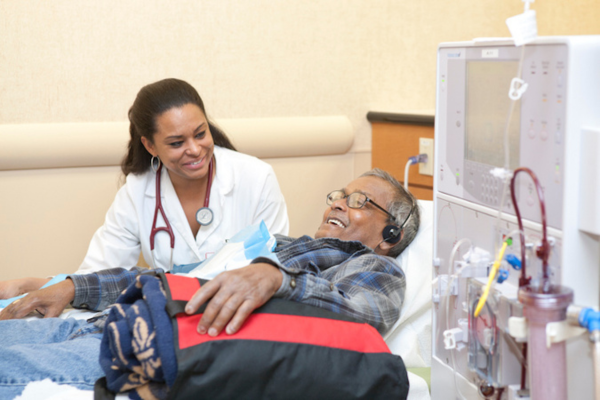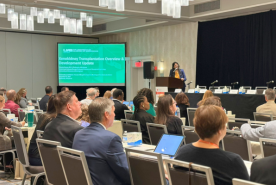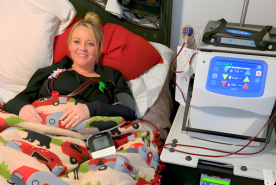May 25, 2023
Continuing education series for professionals.
Transitioning to dialysis is often a complicated and confusing development for our patients. It is the role of healthcare providers to understand these struggles and prepare them to succeed in their new life situations.
Kidney disease patients transitioning to dialysis
Whether a patient knows about their kidney disease diagnosis or crashes into kidney failure, going on dialysis is a life-changing event requiring significant education."Nephrologists are first to speak with patients about dialysis modalities and give recommendations based on their medical history and resources. Since nephrologists see so many patients, they may not have the time to talk about the nitty-gritty details about each modality," said registered dietitian Gretchen Weiss. "That's where dialysis education classes come in handy. A social worker and kidney dietitian typically run them and explain the pros and cons of each modality."
When choosing a dialysis modality, patients need to consider the following:
- Living arrangements
- Space in the home for equipment
- Transportation
- Dietary restrictions per modality
- If a care partner is needed
"Most of the other large dialysis organizations have options for free classes that the patients can sign up for themselves. They have trained educators that talk about dialysis options and kidney disease stages up to dialysis and transplantation," said Assistant Professor of Medicine Nupar Gupta. "These can be virtual or in person in small or large groups."
Download the ESKD Life-Plan Documentation Template.
Transitioning from acute kidney injury to dialysis
When a patient comes in with AKI, it is crucial to understand the cause and relay that information to them.
"I speak to the patient directly at the bedside and explain what their acute kidney injury is from," said Suzanne Payne, renal case manager. "I depend heavily on my nephrologist and other physicians to discuss the cause and how to alleviate the issue. If they need dialysis, I explain how it is temporary and what their road to recovery looks like. Most importantly, I want them to understand the education, follow up with their nephrologist, and monitor their labs."
Since every AKI episode increases the risk of kidney disease and kidney failure, there is a chance that the patient may need to transition to permanent dialysis.
"Going from temporary dialysis for acute kidney injury to continuous renal replacement therapy can be very devastating. Some of these individuals may have never heard of acute kidney injury or dialysis," said Heather Eckstein, nurse practitioner. "They go through consent for the therapy, which explains the pre-procedure followed by the necessary treatment for the condition. I discuss what dialysis does, the risks and benefits of starting it based on their age and past medical history, and signs and symptoms of recovery."
Transitioning to dialysis should include educational sessions in:
- Line access
- Timing of dialysis sessions
- Nutrition
Read the KDOQI US Commentary on the 2012 KDIGO Clinical Practice Guideline for AKI.
"I like to spread the education over a couple of visits. I do that because people get inundated with so much new information after a diagnosis. I have a broad dialysis nutrition guide that covers all nutrient needs specific to their situation and a corresponding grocery list. I ask how they learn best–whether they prefer visual examples, meal plan samples, or if they prefer to read on their own and discuss," Gretchen Weiss said. "I focus on creating an individual diet prescription or diet order with their actual energy, protein, potassium, phosphorus, and calcium needs."
Resources to share with your patients
These resources may help your patients better understand the transition to dialysis.
- Acute Kidney Injury (AKI)
- Choosing a Treatment for Kidney Failure
- Plant-Based Diets and Kidney Disease
- How to Read a Comprehensive Metabolic Panel
- Empower Yourself with NKF's Kidney Health Resources
Earn CE On the Go
Listen and earn CE as our panelists delve into the subjects that matter most to you while offering in-depth clinical updates and real-world examples of these changes. Subscribe to The Kidney Commute Podcast.


















